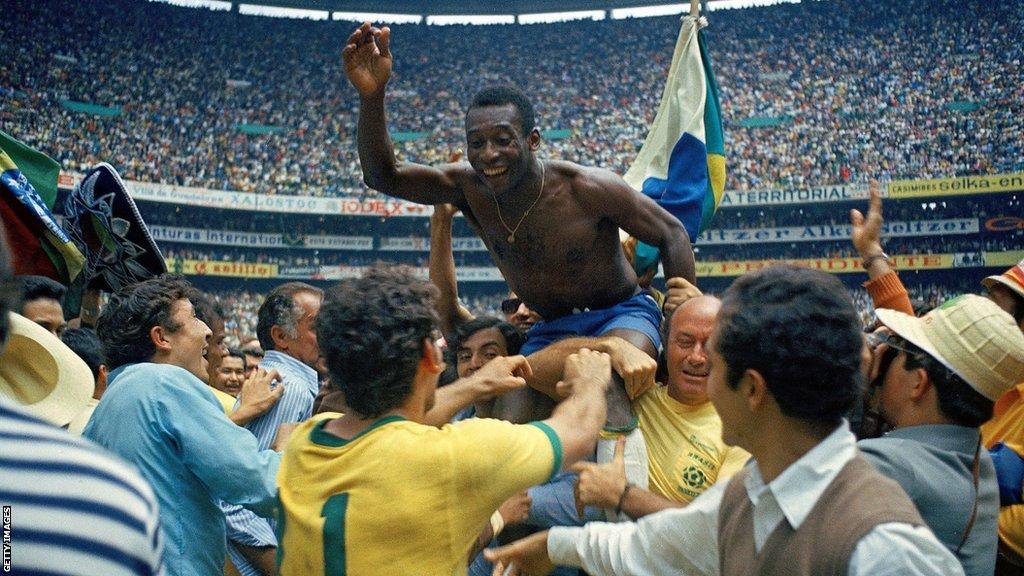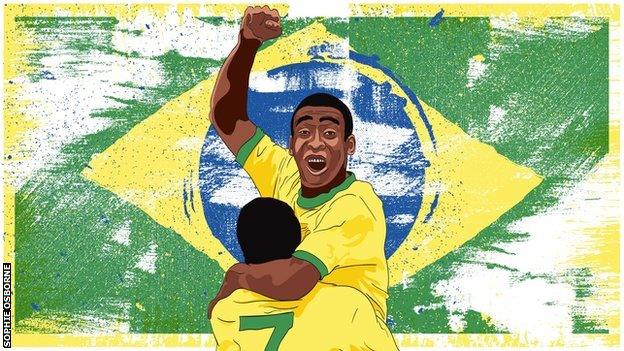Pele: Seven reminders why Brazilian is a footballing great
- Published

Pele won the World Cup three times with his country - in 1958, 1962 and 1970
Whenever there is debate about who is the greatest player of all time, one name is a given on the list - Pele.
The Brazilian won three World Cups - the first at 17 and the last as the talisman, in 1970, for arguably the finest ever XI.
He scored more than 1,200 career goals and is the protagonist of some of the most revered and replayed moments in football history.
And yet, many will never have had the joy of witnessing him kick a ball live.
Following his death at the age of 82, BBC Sport has selected seven of Pele's finest moments to showcase what made the Brazilian so special.
A hat-trick in his first World Cup
Having made his professional debut for Santos at the age of just 16, Pele was selected to represent Brazil in the 1958 World Cup in Sweden when he was just a year older. He would belie his inexperience in stunning fashion.
His first goal of the tournament - in the 1-0 quarter-final win over Wales - would be just a taster of what was to come in the semis, when he struck a second-half hat-trick to blow away France 5-2.
Pele scores a hat-trick against France in 1958 World Cup semi-final
Performing on the biggest stage
But he was not yet done in Sweden.
Against the hosts in the final in Solna, he would score two more: the first, a brilliant volleyed finish after a sublime chip over a defender; the second, a steered header. It helped secure another 5-2 victory to give his country their first World Cup win.
Writing in his autobiography on that World Cup win, he said: "It was an indescribable feeling and one I wanted to experience again. And again."
Great World Cup moments: Magnificent Pele
Pele from the halfway line
Lobbed efforts from the halfway line have been seen a few times over the years in recent times, but Pele got there first - and on the biggest stage.
In the 1970 World Cup group game with Czechoslovakia, with the score at 1-1, he spotted goalkeeper Ivo Viktor off his line and launched an outrageous shot from inside his own half that sailed just inches wide.
After what would end in a 4-1 Brazil win, he admitted that the effort was all planned - devised after spotting that European goalkeepers had a tendency to wander from their line. His only regret was that he had not saved it for a more illustrious opponent.
World Cup moments: Pele's cheeky lob
A stunning set-piece
In the final group game of Brazil's 1970 World Cup campaign, they came up against Romania.
Pele would score twice in the game, the first coming via a fiercely-struck free-kick that left poor goalkeeper Stere Adamache staggering powerless in his goalmouth.
Pele scores free-kick against Romania in 1970 World Cup
The dummy against Uruguay
Later in the 1970 tournament, Brazil came up against Uruguay in the last four. It would be another Pele masterclass.
He would not score in the game but would come mightily close, courtesy of a shot set up by an outrageous bit of improvisation.
In stoppage time, Tostao's through ball for Pele drew out Uruguay keeper Ladislao Mazurkiewicz, but instead of taking it around him, the forward dummied, allowing the ball to run past both him and his opponent.
Having been forced to shoot first time because of a backtracking defender, Pele's shot rolled agonisingly wide.
Great World Cup moments: Pele's dummy
A tale of two leaps
Having reached the final of the 1970 World Cup, Pele and his side were in no mood to allow the opportunity to claim an unprecedented third World Cup triumph pass them by.
The forward got the ball rolling in a one-sided final with Italy, rising higher than defender Tarcisio Burgnich to head in the opener before then leaping into the arms of Jairzinho for one of the most famous celebrations of all time...
Pele scores header against Italy in 1970 World Cup
The greatest World Cup goal?
Pele's closing act in the 1970 final was to be the supplier for one of the finest goals ever scored on the world stage.
The final with Italy was already done and dusted at 3-1, but with perfect timing, Brazil saved their best for last - a true team goal that swept across the field, ending with Pele nonchalantly laying off the ball with perfect weight for Carlos Alberto to lash the ball first time into the far corner of the net...
World Cup moments: Beautiful Brazil

You may also want to read:
BBC Sport tells the story of Pele and his role in helping Brazil bring us the beautiful game in 1970.
